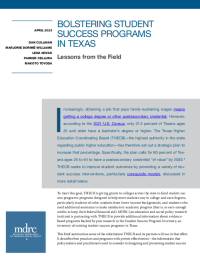Bolstering Student Success Programs in Texas
Lessons from the Field

Increasingly, obtaining a job that pays family-sustaining wages means getting a college degree or other postsecondary credential. However, according to the 2021 U.S. Census, only 31.5 percent of Texans ages 25 and older have a bachelor’s degree or higher. The Texas Higher Education Coordinating Board (THECB)—the highest authority in the state regarding public higher education—has therefore set out a strategic plan to increase that percentage. Specifically, the plan calls for 60 percent of Texans ages 25 to 64 to have a postsecondary credential “of value” by 2030. THECB seeks to improve student outcomes by promoting a variety of student success interventions.
To meet this goal, THECB is giving grants to colleges across the state to fund student success programs: programs designed to help more students stay in college and earn degrees, particularly students of color, students from lower-income backgrounds, and students who need additional assistance to make satisfactory academic progress (that is, to earn enough credits to keep their federal financial aid). MDRC is partnering with THECB to provide additional information about evidence-based programs backed by past research to the Student Success Program Inventory, an inventory of existing student success programs in Texas.
This brief summarizes some of the information THECB and its partners will use in that effort. It describes best practices and programs with proven effectiveness—the information that policymakers and practitioners need to consider in designing and promoting student success programs. The findings are based on MDRC’s 20-year history conducting rigorous evaluations in postsecondary education as well as research and evaluations by other researchers.






